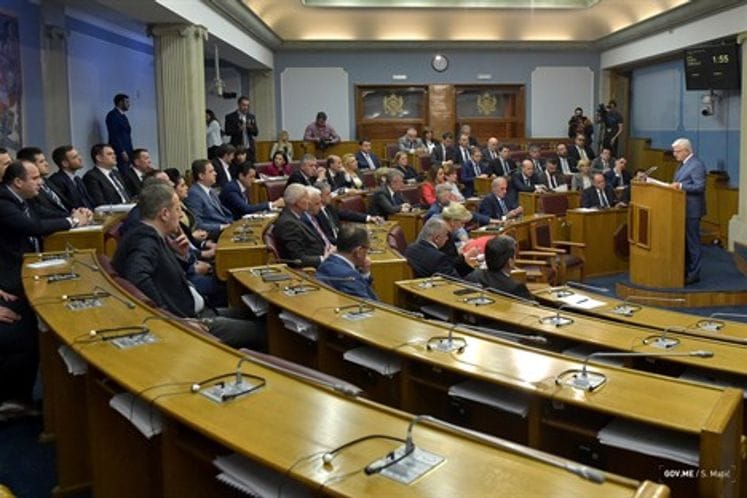- Government of Montenegro
Questions to the Prime Minister: Budget revenues i...
Questions to the Prime Minister: Budget revenues increased by 11.2% in April 2017

Podgorica, Montenegro (26 April 2017) -- Questions to the Prime Minister session was held earlier today at the Parliament of Montenegro, where Prime Minister Duško Marković faced questions from MPs.
Branimir Gvozdenović, on behalf of the Caucus of the Democratic Party of Socialists, asked the Prime Minister about the dynamics of implementation of reform measures set out in the inaugural speech and Montenegro Economic Reform Programme 2017-2019.
Responding to the question, PM Marković said that budget revenues were increased by 11.2% in April 2017 compared to April 2016.
“It is really encouraging data,” the Prime Minister stressed.
“Most of the priority reform measures set out in the reform agenda are being implemented according to the plan,” PM Marković stressed, adding that all this supports the notion of achieving economic growth by 3.2% in 2017, projected in the Montenegro Economic Reform Programme for 2017.
“I will remind you that the projections of economic growth issued by our international partners are even more optimistic and encouraging. Namely, the World Bank has projected real growth of the Montenegrin economy at a rate of 3.3%, and the European Commission projected it at the rate of 3.7% in 2017. I can tell you that I would be dissatisfied with a growth rate of 3.2%, although this is our projection,” PM Marković underlined.
Vujica Lazović, on behalf of of the Caucus of the Social Democrats, asked the Prime Minister about the development of the northern region of Montenegro.
The Prime Minister explained that the Action Plan for the implementation of the Regional Development Strategy in 2017, which the Government has adopted, envisages EUR 376.3 million for the development of the northern region in 2017.
“A total of 79% of the investments refers to the sustained growth of the north, 16% refers to the smart growth, while 5% refers to the inclusive growth, as the third direction of development of the northern region, as defined by the Regional Development Strategy,” PM Marković said. According to him, investments in sustainable growth of the north of the country include investments in road infrastructure, agriculture and rural development, environmental protection and energy. In that regard, the Capital Budget for 2017 envisages over EUR 200 million for projects in the field of road infrastructure in 2017.
Answering the question of Genci Nimanbegu, MP from the Caucus of the Bosniak Party, Coalition “Shqiptaret te vendosur” and the Croatian Civil Initiative, PM Marković expressed his appreciation and congratulations to the Minister of Education and his team for an extraordinarily prepared package of reforms of the education system. He emphasised that one of the aims of the reform is the stimulation of good students.
“We have decided to provide stimuli to the best students. Since their very entry into the education system, we need to show them that we take care of them and that their future is tied to this country. Thus, in line with the amendments to the General Law on Education, the Fund for the qualities and talents is going to be established in Montenegro for the first time. It will create opportunities for rewarding the best students and their teachers, as well as for improving the process of learning and acquiring job skills. In that case, the focus will be put on those institutions that need that the most, such as rural schools,” the Prime Minister said.
Referring to the comparative data of the EU countries, the Prime Minister said that unemployment is at the lowest where the needs for skills and qualifications are determined in cooperation with employers.
“Therefore, the proposed amendments to the Law on Vocational Education provide for incentives for employers to ensure the implementation for dual education. The Ministry will provide funds for allowances to students of the first and second grade in the dual education, and allowances for the third-grade students will be the responsibility of the employer. Student allowances in the dual education will amount from 10 to 20% of the average net salary in Montenegro,” the Prime Minister stated.
PM Duško Marković reiterated that the Law on Higher Education provides for free studies for undergraduate students, who will enroll in public universities during this academic year, while the master study will be free starting from the 2020/2021 school year.
Prime Minister Marković answered the reporters’ questions, as well. They asked him, inter alia, about the security situation, Russia’s decision to ban imports of “Plantaže” wine and political parties ‘comments on the work of the State Prosecutor’s Office.
PUBLIC RELATIONS SERVICE OF THE GOVERNMENT OF MONTENEGRO
